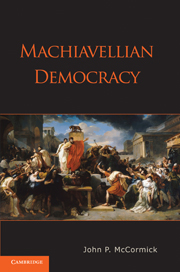Book contents
2 - Democratic Republics and the Oppressive Appetite of Young Nobles
Published online by Cambridge University Press: 05 June 2012
Summary
When the plebs remained quiet within their bounds, the young nobles began to harm them.
Machiavelli, Discourses I.46The kind of numerous and armed people necessary to achieve a great empire cannot be managed in any mode you please.
Machiavelli, Discourses I.6What was Machiavelli's intention in writing The Prince? This is one of the most anxiously posed questions in the history of political thought. Was it to advise a prince, or to undo him; to encourage tyranny, or to moderate it? Astute interpreters begin to answer this question by focusing on the book's dedicatee, Lorenzo de' Medici, proceeding then to read The Prince in light of how Lorenzo specifically, or a young prince more generally, might receive, understand, and act upon the book's advice. However, few scholars ask the same question – or ask it with comparable urgency – of Machiavelli's greatest work, Discourses on Titus Livy's First Ten Books. Even perceptive readers largely assume that the purpose of the Discourses is self-evident – to promote republics – and that its immediate audience is obvious – two young friends with republican sympathies. Since Machiavelli dedicates the Discourses to interlocutors from his literary circle, the Orti Oricellari, who supposedly share his political predilections, the book is assumed to be a more straightforward and less rhetorically artful work than The Prince. In other words, one need not ponder too deeply the relationship between the book's declared audience and its content.
- Type
- Chapter
- Information
- Machiavellian Democracy , pp. 36 - 62Publisher: Cambridge University PressPrint publication year: 2011



